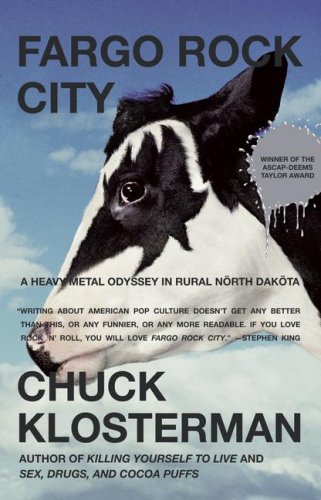
Country: USA
Genre: Non-Fiction/Memoir
Pages: 272
The way I see things, Chuck Klosterman should be a mandatory reading in every college of America. Or almost. The shaggy rock critic has understood the importance of media and pop culture in Occidental society. He goes over the tiniest factors with a thoroughness and a passion that wakes the reader up from MTV-induced sleepwalking. Only he's just judgmental enough to keep you at a polite distance. I'll tell you something though, he quickly became one of my favorite controversial writers. Fargo Rock City is a memoir, but also an exploration of the hair metal phenomenon in the eighties. It's touching, smart, aware and it goes inevitably overboard in an attempt to cover the subject of metal in a broader scope.
As long as he contains himself to the paradigm of hair metal, Klosterman is nothing short of brilliant. He's a child of the eighties, who grew up in an isolated rural town, longing for something different than the everyday struggle of the farm. From the day he discovered Mötley Crüe's Shout At The Devil, he entered what he called "the wormhole of hait metal", a musical style that represent a constructed reality that defied life as he understood it from his experience. Chuckie K. covers a period that goes from 1983 to 1997, which represents the lifespan of hair metal from his discovery to the slow and painful death and the somewhat resurrection in had through certain nu-metal artists (Marilyn Manson and Kid Rock amongst others). It's the history of a music genre, but it's also a story of a young man who longs for belonging.
Every chapter is a small essay that articulate itself around the event used in the title. You can read Fargo Rock City from cover to cover, but also bits by bits, and not necessarily in numerical order. It's a bit deceiving at first, because you expect him to actually talk about the issue. For example, the two kids who shot themselves and blamed it on Judas Priest, but it soon turns out to be a lot richer than a simple historiographic retelling. Each one of those events represent a thematic that has been associated with hair metal, which Klosterman discourses then in great details: Sex, androginy, musicmanship, drugs, videos, etc. His point of view is enlightening and his angle on his subject is refreshing as hell. He carefully weights the influence of a manufactured, promotional music on the souls of the generation who bought it.
As I said, as soon as he's broadening up the scope of his research, he starts making incendiary comments based on shallow observations. Slayer, for example, which is a band that (I know, I love them) had a way, way bigger social reach than the ephemeral starts of the eighties, but because it contradicts the point of his novel, he condemns them and the whole spectrum of extreme metal to be : "a subculture with no legs". I know I'm everything but disinterested here, but I know extreme metal very well, better than him even, and I think he's shooting himself in the foot by brushing the whole current away with the back of his hands. Hair metal musicians were shooting stars, but metal as a whole functions with ideals of strength, diligence and loyalty. On some musicians he's extremely accurate and helps actually demystify their legends (Yngwie Malmsteen for example), but he cuts the corners shorts at the end which made me go: "Aaaargh come on, you were almost there, man. Don't fuck it up".
Fargo Rock City is Chuck Klosterman on his best day. It's his first book, but you can feel the experience of his pen and the arrogance of youth battling on the page. It's a delicious, yet too short little read and it offers some fascinating insight on what I referred too commonly as "metal for pussies" in my early youth. Klosterman offers amazing insight on the social significance of bands like Guns N' Roses, Whitesnake, Poison and Mötley Crüe. It's a zesting read that will turn your mind on and make you more aware about the ways the world has to construct your identity. I'm ready to forgive him about Slayer, even to see this in a positive light. If Klosterman brushed them away, it's up to me to write an essay about why they have became the immortal and vengeful gods of extreme metal. I am urging you to read this if you're a thinking person that was born before 1988. This book is aiming at you.
